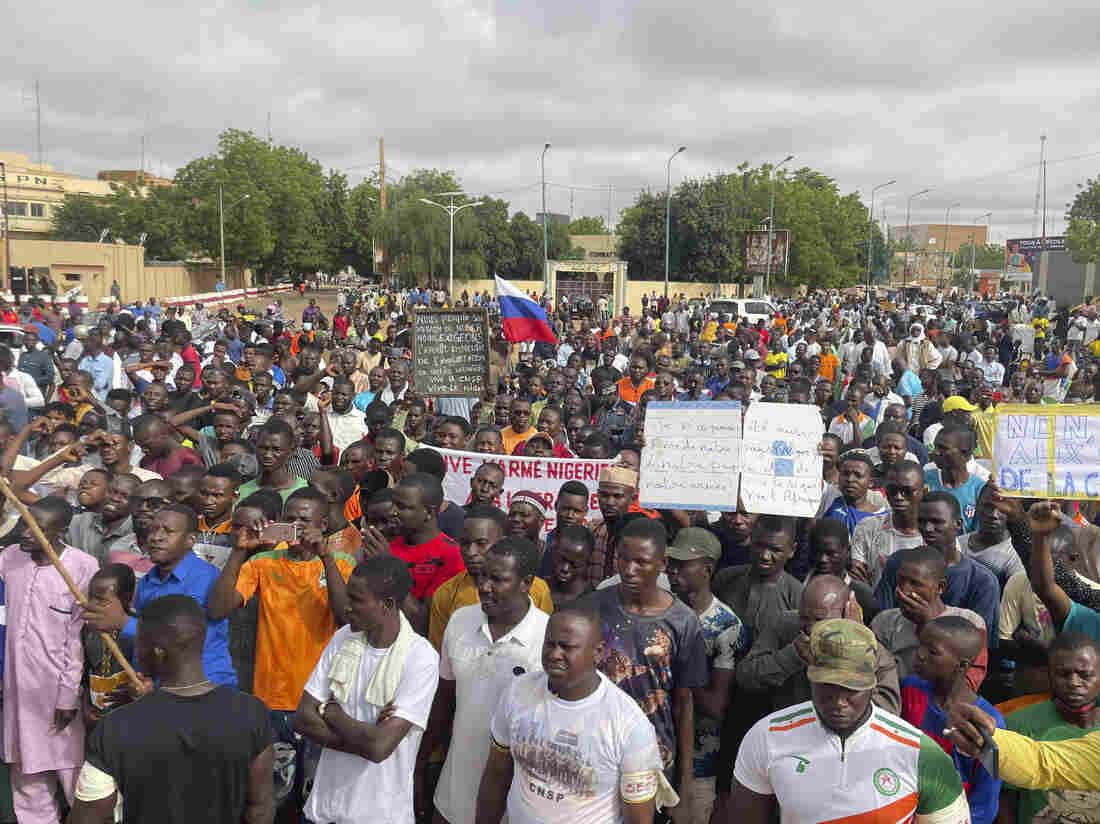Africa
U.S. troops and equipment will leave Niger by mid-September, the Pentagon says
Supporters of Niger’s ruling junta gather for a protest in Niamey, Niger, on Aug. 3, 2023.
Sam Mednick/AP
hide caption
toggle caption
Sam Mednick/AP
Supporters of Niger’s ruling junta gather for a protest in Niamey, Niger, on Aug. 3, 2023.
Sam Mednick/AP
WASHINGTON — U.S. troops ordered out of Niger by the West African country’s ruling junta will complete their withdrawal by the middle of September, the Pentagon and Nigerien defense officials said Sunday.
The timeline was the product of four days of talks between the countries’ defense officials in the capital city of Niamey, according to a joint statement.
Niger’s decision to kick out American forces dealt a blow to U.S. military operations in the Sahel, a vast region south of the Sahara desert where groups linked to al-Qaida and the Islamic State group operate.
U.S. troops and some gear already have begun leaving the country, a senior military official and a senior defense official who briefed reporters on a call Sunday said. The plan is to remove all lethal, hazardous or classified equipment before the last U.S. troops depart, but items that are determined to be too expensive to fly out could be left for the Nigerien military to use instead, the officials said.
The U.S. also will leave behind infrastructure it has built over the years to support the approximately 1,000 troops who have been based there to conduct counterterrorism missions, the officials said. Fewer than 1,000 U.S. troops are still in Niger, mostly on an airbase near Agadez, some 920 kilometers (550 miles) away from the capital.
The officials spoke on the condition of anonymity to discuss sensitive details of the withdrawal.
The officials called Niger an “anchor” in U.S. counterrorism efforts over the last decade, and they are still looking at options on how to fill that gap. The officials said that their hope is to continue to work with the Nigerien military on counterterrorism work in the future, even if U.S. troops are not based there on the ground.
The rupture in military cooperation followed last July’s ouster of the country’s democratically elected president by mutinous soldiers. A few months later, the ruling junta asked French forces to leave and turned to the Russian mercenary group Wagner for security assistance.
The officials said they did not have indications that the Wagner group may end up increasing its influence over the Nigerien military in the absence of U.S. personnel,
In October, Washington officially designated the military takeover as a coup, which triggered U.S. laws restricting the military support and aid that it can provide to Niger.
Until recently, Washington considered Niger a key partner and ally in a region swept by coups in recent years, investing millions of dollars in the Agadez base, which has been critical to U.S. counterterrorism operations in the Sahel. The United States also has invested hundreds of millions of dollars in training Niger’s military since it began operations there in 2013.
The Pentagon has also said the U.S. will relocate most of the approximately 100 forces it has deployed in neighboring Chad for now. But talks are expected to resume next month about revising an agreement that allows U.S. troops to be based in Chad.
